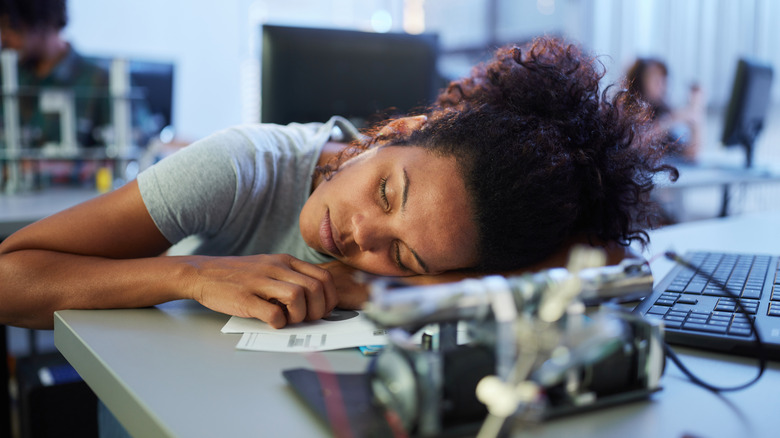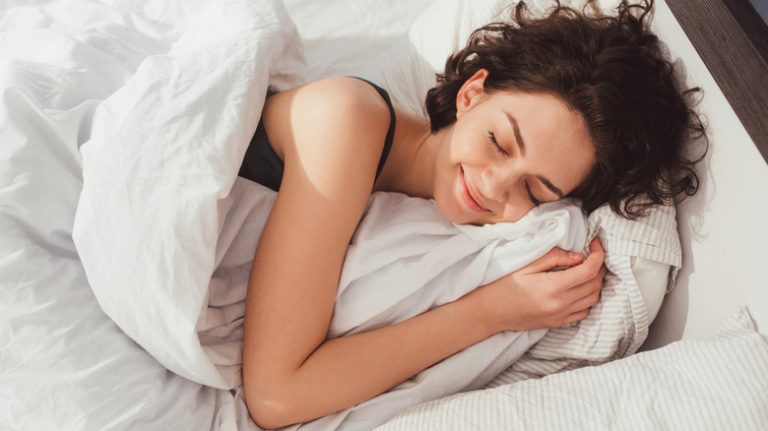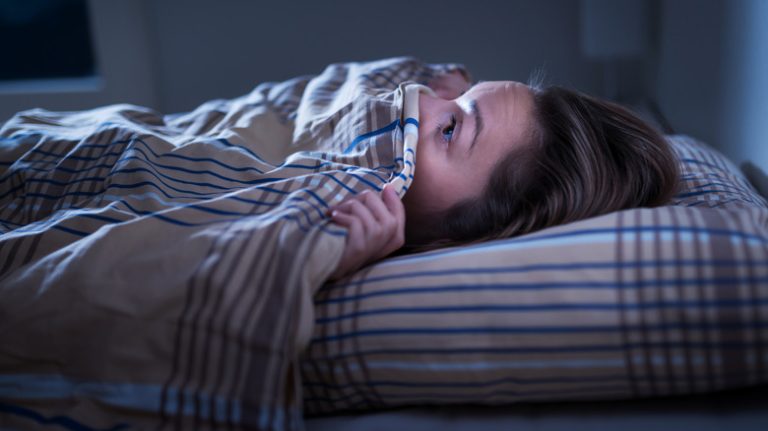There is something glorious about sleep — especially after a long, tiring day. You get under the covers, switch off the lights, and snuggle up in bed before drifting off to a restful snooze.
But if you’re waking up constantly tired (despite the recommended seven or more hours of sleep a night) and you’re feeling the urge to sleep during the day, you might be wondering if you’re addicted to sleep. While the need for sleep can feel compelling enough to call it an addiction, health professionals say that sleep addiction isn’t a medically diagnosed condition. Board-certified sleep physician and American Sleep Association representative, Dr. Neil Kline, told Vice, “Sleep is a basic, biologic need — just like breathing and eating, we need sleep to live. To say that someone is addicted to sleep is like saying that one is addicted to breathing.” An addiction, by definition, is craving something in problematic doses or frequencies (via Cleveland Clinic). For necessary substances like food, the line blurs. Food is a biological need too. However, consuming too much food has health consequences (like obesity) — whereas sleeping too much doesn’t.
Feeling like you need to lie down every chance you get may have more to do with a lack of quality sleep than addiction. It’s natural to feel drowsy, irritable, and lethargic if you have a restless night’s sleep, especially over consecutive nights. There are also underlying conditions that can make you feel like you need more sleep.
Sleep disorders can make you feel like you need more sleep

Nutrition, sleep, circadian rhythms, and metabolism specialist Gregory Potter explained to Healthline, “Hypersomnias are recognized sleep disorders characterized by long sleep, excessive daytime sleepiness, or both.” Symptoms include drowsiness, excessive napping, difficulty waking up after a long nap, irritability, memory problems, and fatigue. People with hypersomnia can also have low energy levels, headaches, appetite loss, hallucinations, and suicidal thoughts.
Other conditions could also be contributing factors to your drowsiness. Nutritionist and dietician, Dr. Asma Alam, says (via Hindustan Times), “Excessive daytime sleepiness can also be caused by other conditions like narcolepsy, sleep apnea, dysania, etc. and it is quite likely to have one of the following conditions and confuse them for a sleep addiction.” Narcolepsy is a sleep disorder that presents in symptoms such as loss of muscle tone, sleep paralysis, and hallucinations, per Mayo Clinic. Sleep apnea can bring about snoring, gasping/choking during the night, headaches, concentration issues, mood fluctuations, and high blood pressure. If you’re really struggling to get out of bed in the mornings and are in a constant state of fatigue, you might have dysania, according to Healthline. Dysania is often a symptom of certain sleep disorders, mental health conditions, and chronic fatigue.
Furthermore, mental health conditions like anxiety and depression can also make people feel like they need to stay in bed all day. Someone going through emotional trauma can seek out sleep as a means of escape from their pain, adds Psychology Today.
When you should see a doctor about your sleep concerns

If bad sleep habits, poor diet, or long shifts are causing daytime sleepiness and a need for sleep, you may want to start by making some lifestyle changes. Pay attention to your sleep and wake times and make sure you’re still getting at least seven hours of snooze time. Use blackout curtains and set the right ambiance in your room before you head to bed. Make sure no one disturbs you when you are sleeping. You may also need to determine if you’re actually getting quality sleep at night. Are you on your phone for too long before bed? Are you having too much caffeine close to bedtime? Is your partner’s snoring keeping you up? Sleep divorces may sound controversial, but they may help ensure a better night’s rest.
If you think the underlying cause of wanting more sleep during the day is depression or anxiety, make an appointment with a therapist or psychiatrist. Dealing with your mental health is an important step in getting your sleep patterns under control.
It is also important to rule out any underlying sleep disorders before you start thinking you’re addicted to sleep. If your excessive desire to sleep is getting in the way of your job, other responsibilities, and relationships, it might be a good idea to book an appointment with a sleep specialist. Too much sleep can’t technically harm you — but it can get in the way of living your life.



